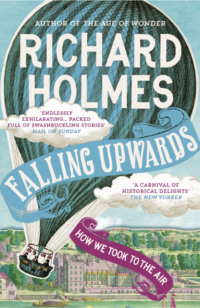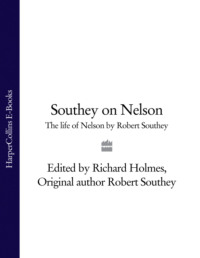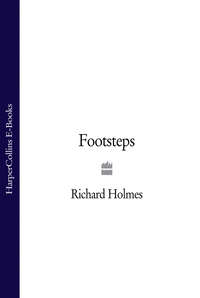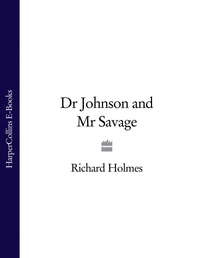
Полная версия
Dr Johnson and Mr Savage

Dr Johnson and Mr Savage
Richard Holmes

To the Rose in the Grove
… For as Johnson is reported to have once said, that ‘he could write the Life of a Broomstick’.
Boswell
Table of Contents
Cover Page
Title Page
Epigraph
Prologue
Chapter 1 Death
Chapter 2 Love
Chapter 3 Night
Chapter 4 Mother
Chapter 5 Bard
Chapter 6 Murder
Chapter 7 Fame
Chapter 8 Friendship
Chapter 9 Arcadia
Chapter 10 Charon
Appendix Note on Savage’s birth and identity
Select Bibliography
References
Index
Acknowledgements
About the Author
Praise
Also By Richard Holmes
Copyright
About the Publisher
Prologue
When Samuel Johnson was compiling his great Dictionary of the English Language, which defines more than forty thousand words, he decided to illustrate his definitions with suitable literary quotations. ‘I therefore extracted,’ he explained in his Preface, ‘from Philosophers principles of science, from Historians remarkable facts, from Chymists complete processes, from Divines striking exhortations, and from Poets beautiful descriptions.’
To do this, he read and annotated over two hundred thousand passages from innumerable English authors across four centuries. He marked up these passages, and handed them to his clerks in his attic at Gough Square to be entered into eighty large vellum notebooks.
He was working at great speed, and he chose his illustrations entirely at random. Most of them are from the great classics of English literature, such as Shakespeare, Milton, Dryden and Pope. But of the 116,000 quotations eventually included, he chose seven from the works of his strange friend Richard Savage. These quotations, and the seven words they illustrate, may have a curious significance. Since they were chosen rapidly and at random, from such a vast source, they could be thought to reveal unconscious links and symbolic meanings. If considered as a form of ‘association-test’, these seven words must instinctively have brought Richard Savage to Johnson’s mind. Thus, to an analyst they might suggest something about the nature of that most puzzling relationship. Here are the seven words, and their illustrations, in alphabetical order.
1. ‘Elevate’ to raise with great conceptions. Savage: ‘Now rising fortune elevates his mind, He shines unclouded, and adorns mankind.’ 2. ‘Expanse’ a body widely extended without inequalities. Savage: ‘Bright as the Etherial, glows the green expanse.’ 3. ‘Fondly’ with great or extreme tenderness. Savage: ‘To be fondly or serenely kind.’ 4. ‘Lone’ solitary, unfrequented, having no company. Savage: ‘Here the lone hour a blank of life displays.’ 5. ‘Squander’ to scatter lavishly, to spend profusely, to throw away in idle prodigality. Savage: They often squandered, but they never gave.’ 6. ‘Sterilise’ to make barren, to deprive of fecundity or the power of production. Savage: ‘Go! sterilize the fertile with thy rage.’ 7. ‘Suicide’ self-murder, the horrid crime of destroying one’s self. Savage: ‘Child of despair, and Suicide my name.’Chapter 1 Death
Everyone knows the great Dr Johnson, and the scholars seem to know him in minutest detail; almost no one knows anything definite now about the obscure, minor poet Richard Savage.1 But Johnson and Savage were friends – intimate friends – in London for about two years in the 1730s. In those dark days in the city, dark for them both in many senses, the position was almost exactly reversed. Johnson was then unknown, and Savage was notorious. Thereby hangs a small, but haunting mystery of biography.
Sir John Hawkins, Johnson’s earliest official biographer, thought the friendship was the single most inexplicable fact about Johnson’s entire career. ‘With one person, however, he commenced an intimacy, the motives to which, at first view, may probably seem harder to be accounted for, than any one particular in his life. This person was Mr Richard Savage …’2
James Boswell, in a moment of rare agreement with Hawkins, thought much the same: ‘Richard Savage: a man, of whom it is difficult to speak impartially, without wondering that he was for some time the intimate companion of Johnson; for his character was marked by profligacy, insolence, and ingratitude …’3
One of the few facts that can be stated without contradiction about Richard Savage was that he died in 1743. So one might begin with his obituary.
Mr Richard Savage, Gent. Report has just reached us in the Bristol mails, of the Demise of Mr Richard Savage, son of the late Earl Rivers, in the debtor’s Confinements of Bristol Newgate gaol. Mr Savage will be recalled as the unhappy Poet and author of ‘The Wanderer’, convicted at the Old Bailey on a capital charge of Murder, and sometimes Volunteer Laureate to her Gracious Majesty Queen Caroline.
Much obscurity attends the Passage of his early life. We have it on his own Authority that he was born in the parish of St Andrew’s, Holborn, in 1698, the bastard Son of the present Mrs Anne Brett, then Lady Macclesfield (though she never acknowledged his Claim), and the late 4th Earl Rivers of Rivers House, Great Queen Street, Holborn. These Circumstances are obliquely referred to in his memorable poem ‘The Bastard’ first given to the World shortly after his Trial in 1728.
Mr Savage first came to Notice with two Spanish dramas, and his Tragedy of ‘Sir Thomas Overbury’ produced at Drury Lane by Mr Cibber in 1723. He was befriended by the essayist Sir Richard Steele, and published a number of poetical Works in The Plain Dealer magazine of Mr Aaron Hill, who proclaimed his Merits and drew attention to his Plight. He became associated with Mr Alexander Pope of Twickenham, and is rumoured to have supplied many of the Scurrilities that furnished the latter’s poetical Satire of ‘The Dunciad’.
As a frequenter of the Coffeehouse, the Salon, and the Green Room, Mr Savage found his Name connected with many of the illustrious Ladies of the day, including the actress Mrs Anne Oldfield, the poetess Martha Sansom, and that assiduous writer of Scandalous romances, Mrs Eliza Haywood.
In November 1727, in consequence of an Affray at Robinson’s Coffeehouse, Charing Cross, he was arrested on a capital charge of Wounding and Murder, found guilty by a Grand Jury Court at the Old Bailey under the direction of Judge Page, and condemned to suffer execution at Tyburn. His Case became celebrated among the Literati and Beau Monde of the capital, and in consequence of the Intercession of his kinsman Lord Tyrconnel and the renowned Patroness of poets my Lady Hertford, he received the Royal Pardon in February 1728.
In relating his Misfortunes, it is remarkable that Mr Savage always afterwards stated that his Mother Mrs Anne Brett, the former Lady Macclesfield, had unaccountably urged the Execution of his sentence against all representations of Mercy, and that it was only the gracious Intercession of her Majesty Queen Caroline which saved him from the Hangman’s Noose. Mr Savage immediately thereafter tasted the delights of Celebrity, and applied precipitously for the position of Poet Laureate; which, failing to obtain, he appointed himself ‘Volunteer Laureate’ to the Queen thereby obtaining an Allowance of £50 per annum until her majesty’s death in 1737. These Facts we have on the Authority of Mr Thomas Birch of the Royal Society.
Mr Savage now came under the Patronage of his generous kinsman Lord Tyrconnel, to whom his poem ‘The Wanderer’ is dedicated. But in consequence of some Misunderstanding, he shortly reverted to his previous condition of Poverty, and with the Cessation of the Queen’s allowance, he was thrown once more upon his Wits and his Friends, in the Town. He once again began to publish a number of poetical Works, in the new Gentleman’s Magazine of Mr Edward Cave at St John’s Gate, Clerkenwell, among which was his poem ‘Of Public Spirit’ (1737); but was menaced with a charge of Obscene Libel for his poem ‘The Progress of a Divine’.
The condition of his Poverty being unrelieved, he threw himself with increasing confidence on the Generosity of his many friends, among whom Mr Solomon Mendez of Hackney, and Mr James Thomson, the distinguished author of ‘The Seasons’, at Richmond; though it is to be feared that some Nights were passed in the Cellars and on the Bulks of Covent Garden, in the company of Beggars, Thieves, and other Denizens of Grub Street.
Mr Savage had for some time revolved a plan of Retirement to the country, where he hoped to re-write and refurbish his original Tragedy of ‘Sir Thomas Overbury’. Accordingly through the Generosity of Mr Alexander Pope, a Subscription of £50 per annum was organized among his friends, and in the summer of 1739 Mr Savage departed for Wales. Here he settled at Swansea and its Environs, where he is supposed to have met his Friend the poet Mr John Dyer, and paid court to the celebrated Beauty of Llanelli, Mrs Bridget Jones. But his Funds once again running low, Mr Savage returned to Bristol to write his Tragedy and informed his Friends of his imminent Return to the Capital, at which much of his Subscription was unaccountably discontinued.
In January 1743 Mr Savage was precipitately arrested for Debt, and conveyed to the Newgate Prison in Bristol, where he received the personal Attentions of the Gaoler Mr Dagge, and died suddenly in his Room on 1st August 1743, being buried at Mr Dagge’s expense in St Peter’s Churchyard, six feet from the south Door of the church.
Mr Richard Savage never married, and had no known Off-spring, though he is survived by his reputed mother Mrs Anne Brett, the former Lady Macclesfield, of Old Bond Street, London. His personal Papers have been obtained by his editor Mr Edward Cave, of the Gentleman’s Magazine.
The facts, and even the rumours, given here accurately represent the public knowledge of Richard Savage’s career at the time of his death, and are indeed historically correct as far as they go. But the obituary itself is a biographer’s fiction. Nothing like it can be found in the memorial columns of the contemporary journals of 1743. I have simply invented it.
This imaginary obituary suggests some of the mysteries and questions that always surrounded Savage’s life. But it is forced to omit the single most surprising fact, because at that time it had not become true. Among the ‘Denizens of Grub Street’ whom Savage encountered in the late 1730s was an unknown young literary novice called Samuel Johnson, who assured his own fame by writing Savage’s biography a year later in 1744.
A life like Savage’s is mysterious in itself, but also mysterious in the way it came to be told and reinterpreted, one version layered upon another, like a piece of complex geology. Its stratified truth was not ready to emerge immediately on his own death, or even in his own century. It depends on the series of its tellers or excavators, of whom our imaginary obituarist of 1743 is one; Samuel Johnson in 1744 is another; Johnson’s own biographers, Sir John Hawkins (1787) and James Boswell (1791), are a third and fourth; and so on down a line of scholars, Victorian antiquarians and modern academics to our own time. Through these rich and varied workings of research and story-telling the buried figure of Savage slowly rises back to life again.
The subject of this book is one particular version, the ‘original’ version, Johnson’s Savage. But it is also the question of versions itself. It is the biography of a biography. It concerns the kind of human truth, poised between fact and fiction, which a biographer can obtain as he tells the story of another’s life, and thereby makes it both his own (like a friendship) and the public’s (like a betrayal). It asks what we can know, and what we can believe, and finally what we can love.
If there was no official obituary of Savage in 1743, it is still possible to discover how his contemporaries felt about him very close to the time of his death, from public knowledge about his scandalous reputation and from popular hearsay. This must be the start, or first layer, of the investigation.
What emerges initially is a tale of controversy, sensationalism, disputed facts, and a good deal of eighteenth-century moralising about social justice and personal cruelty. Three documents vividly substantiate this: a poem, a letter, and an advertiser’s announcement. Each of these is an early example of the memorial process at work, by which a private life begins to take its place in a nation’s history.
Savage’s life was seen from the start as containing the elements of a crime thriller, which would appeal to a popular as much as a literary readership. Savage, as his very name seemed to suggest, was a poet-killer with a peculiar violence in his relationships. His story begins in an aristocratic divorce court, emerges in the world of publicity and the new monthly magazines, continues in a murder trial, touches upon fashion, politics and royalty, and ends suddenly and disgracefully in a debtors’ prison. More than any other English poet since Christopher Marlowe, Savage’s reputation was notorious and his true identity problematic, though for very different reasons to Marlowe’s. His ‘case’ was exemplary to his age, even if no one could quite agree what it exemplified, or who – ultimately – was to blame for its tragedy.
In the month of his death, the Gentleman’s Magazine, which had to some degree sponsored the final stages of his career and had a literary investment in his story, published a verse ‘Epitaph on the late R------d S------e Esq’. This emphasised the tragic aspects of the affair. It referred obliquely to his poetic powers, his wit, his illegitimacy, his trial, his laureateship, and his ‘cruel’ and vengeful mother.
The anonymous Epitaph writer begins by invoking Phoebus, the god of Poetry – which is like placing a classical bust at the entrance of the Vauxhall Pleasure Gardens. Savage’s raffish life is grandly presented as a contest between two powerful patrons: unworldly Poetry and Worldly Fortune, who are necessarily hostile to each other.
Whom Phoebus favour’d, on whom Fortune frown’d
Lies deep beneath this consecrated ground.
Savage the name: – he was design’d by Fate,
That err’d at his conception, to be great.
And such he was, in boundless wit and pride;
Tide and heir his Mother’s lust deny’d.
Within the tight, gavotte-like turns of mid-eighteenth-century occasional verse, the Epitaphist plays decorously on the idea of Savage’s ‘greatness’. Here was a great poet perhaps, but not a great social success. He was a man of great wit (in the sense of intelligence, rather than humour); but also great in his pride, arrogance and self-esteem – qualities which can blunt wit or make it blind. Then comes the scandalous, journalistic punch line: he should have been great in family title and financial inheritance too, but this was ‘deny’d’ him by his mother and – more outrageous yet – by his mother’s ‘lust’. This seems to be a libellous attack on the Countess of Macclesfield.
The Epitaphist now moves swiftly on to enlist sympathy for Savage. He suffered from poverty and dangerous misfortunes, yet he continued to write poetry. His mother cruelly withheld her support, but his Queen eventually saved him, and Heaven pitied him and forgave him, so that a greater justice eventually prevailed in his life.
… His life was Want, yet could his duteous Verse
The Cruel’s praise, that help withheld, rehearse.
Danger extreme*, th’unhappy lawless knew,
And woes he felt, as woes were all his due.
Twice sov’reign Mercy found, a Queen* to save,
From pitying Heaven, to end his cares, a grave.4
It is remarkable that the Epitaphist assumes that all his readers will be familiar with the circumstances of Savage’s trial, more than fifteen years before, and merely puts asterisks against the references to it, with a knowing footnote. His cause is still alive, even if the ‘unhappy’ poet himself is dead. Injustice, as much as poetry, has already granted him a kind of immortality.
Even though published in the Gentleman’s Magazine, a largely pro-Savage paper, the Epitaph is by no means a panegyric. It accepts that Savage is a controversial figure, that the woes he felt were all his ‘due’, that he brought trouble on himself, that he was ‘lawless’ and that his ‘cares’ drove him to a premature grave. Nevertheless he remains a man of genius, a poet hounded by ‘the Cruel’ woman and suffering some ill-defined persecution and social injustice. Savage is not merely a case; he is already a cause.
The second document is an open letter to Edward Cave, the editor of the Gentleman’s Magazine under his pseudonym Mr Urban, announcing a forthcoming biography of Savage. It appeared within three weeks of Savage’s death in Bristol, and immediately demonstrates how topical the cause was. As the announcement explains, the anonymous writer will defend Savage’s memory, and use his personal knowledge of the subject to produce an intimate portrait. It will be the work of a friend and confidante.
Mr Urban: As your Collections show how often you have owed the Ornaments of your poetical Pages, to the Correspondence of the unfortunate and ingenious Mr Savage, I doubt not but you have so much regard to his Memory as to encourage any designs that may have a tendency to the Preservation of it from Insults or Calumnies, and therefore with some Degree of Assurance intreat you to inform the Publick, that his Life will speedily be published by a Person who was favoured with his Confidence, and received from himself an Account of most of the Transactions which he proposes to mention to the Time of his Retirement to Swansea in Wales.5
The letter adds that the Life will also give details of his imprisonment in Bristol, and use extracts from Savage’s own private letters and those of his friends: ‘materials still less liable to Objection’.
Great emphasis is laid on the speed at which this Life will be produced, and the accuracy of its sources. Other potential biographers are warned off the subject. The readers must also beware of any rival, romanticised versions which rely on speculation or fiction.
It may be reasonably imagined that others may have the same Design, but as it is not credible that they can obtain the same Materials, it must be expected they will supply from Invention the want of Intelligence, and that under the Title of the Life of Savage they will publish only a Novel filled with romantick Adventures, and imaginary Amours. You may therefore perhaps gratify the Lovers of Truth and Wit by giving me leave to inform them in your Magazine, that my Account will be published in 8vo by Mr Roberts in Warwick-Lane.6
This book is to be a true biography, quite different from the kind of ‘novelized’ lives which had become popular through the work of Daniel Defoe or Eliza Haywood, with their obsession with scandalous adventures and sexual exploits. The biography will be committed to an ideal of human truth, moral truth. It will be based on a distinction between fact and fiction. In short, the letter makes both a commercial claim to the literary market in Savage, and an aesthetic claim about the form of true biography. It adds, in a forthright manner, where the Life can be bought; though not yet the price.
This letter is written by the young Samuel Johnson, and is of historic importance in the development of English biography. It confidently asserts the value of the biographic form to a general public, the ‘Lovers of Truth and Wit’; and aggressively declares war on the titillating fictional art of the Novel.
Samuel Johnson’s publisher, Mr James Roberts of Warwick Lane off the Strand, saw the Savage story in different terms. As a publisher, Roberts specialised in tales of social scandal, runaway heiresses, adulterous skirmishes among the aristocracy, lost fortunes, orphaned sons, and careers of glittering crime. The Savage saga was easily adapted to this formula, and Roberts accordingly placed a long advertisement in the London Evening Post pointing out that the biography – though literary in appearance – could be safely relied on for its sensational contents. In this third document, Savage’s life is seen as a labyrinth of deceit, injustice, passion and wrongdoing: in short, everything that might be expected of a poet’s unstable existence in a materialistic society, redeemed only by the gracious interventions of royalty.
An account of the life of Mr Richard Savage, son of the late Earl Rivers. Who was, soon after he came into the world, bastardised by an act of Parliament, and deprived of the title and estate to which he was born; was committed by his mother, the Countess of Macclesfield, to a poor woman, to be bred up as her own son; came to the knowledge of his real mother, now alive, but abandoned by her, persecuted, and condemned for murder, and against all her endeavours, pardoned; made poet laureate to Queen Caroline, became very eminent for his writings, of which many are quoted in this Work, particularly the ‘Bastard’, the ‘Wanderer’, ‘Volunteer Laureate’, and ‘Author to be Let’; went into Wales, to be supported by a subscription, promoted by Mr Pope, but at last died in Prison.7
This racy summary, with its neat and misleading telescoping of facts, conforms to the shape of what we might call an urban fairy tale. Savage is a kind of Frog Prince, placed under a cruel spell by his Wicked Mother, and saved from the jaws of death by the Good Queen, who transforms him back into his true self as an eminent poet. The premature death in prison, somehow under the auspices of Mr Pope (the most financially successful poet of the age), becomes a kind of moral to this tale. The poor Poet, whether saved or not, will always suffer for his Art. This is not so remote from the story actually told by Johnson; but it indicates what the public wanted to hear about Savage. His life will be an awful – and delicious – warning; and incidentally a very good read.
These are the reactions which people had to Richard Savage at the time of his death in 1743. They are already complicated and various. Savage had caught the popular imagination in a remarkable way. But most remarkable was the biographer who immediately entered the lists on his behalf. Who was this man?
Here again we are confronted with something peculiar in the nature of biography, and its layerings through time. If we assume that it was Dr Samuel Johnson (who received his doctorate from Trinity College, Dublin, in 1765), the man who subsequently made a household name in English literature through the work of James Boswell, we will understand little of the story that now begins to emerge. We have to deconstruct almost entirely that powerful, domineering, confident, late-eighteenth-century figure whom Boswell created in his own biography. We have to recover a much more shadowy, fraught and uncertain personality: young Sam Johnson, failed schoolmaster, provincial poet, and desperate Grub Street hack, who signed his letters in 1738 ‘impransus’ – supperless.









